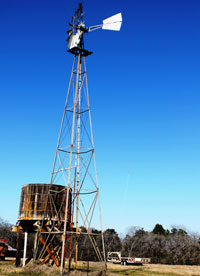Carthage, Texas -- A Texas Well Owner Network, or TWON, training has been scheduled for Sept. 25 in Carthage.
The training, which is free and open to the public, will be from 8:00 a.m.-noon at the Panola County Expo Center, 2 Ballpark Road. A lunch, sponsored by the Panola Soil and Water Conservation District and Panola Groundwater Conservation District, will be provided immediately following the workshop.

He said participants may bring well-water samples to the training for screening. The cost is $10 per sample, due when samples are turned in.
“Water samples will be screened for nitrates, total dissolved solids, pH and bacteria,” Gholson said.
Well owners who would like to have their well water sampled can pick up two sample containers from the AgriLife Extension office in Panola County at 522 W. College St. in Carthage. They may also obtain sample containers from the Panola County Soil and Water Conservation District office or the Panola County Groundwater Conservation District office.
Bringing water samples to the training is not required, Gholson said, but those wanting to have water samples analyzed must attend.
Gholson said space is limited, so attendees are requested to register at http://twon.tamu.edu/training or by calling 979-845-1461 as soon as possible.
The training is one of several being conducted statewide through the Texas Well Owner Network project.
“The core content of this program is the same as other trainings, but the information is tailored to local water quality issues and aquifers,” Gholson said.
More than a million private water wells in Texas provide water to citizens in rural areas and increasingly to those living on small acreages at the growing rural-urban interface. Private well owners are independently responsible for monitoring the quality of their wells.
“They are responsible for all aspects of ensuring their drinking water system is safe – testing, inspecting, maintaining it,” Gholson said. “This training will help private well owners to understand and care for their wells.”
Funding for the Texas Well Owner Network is through a Clean Water Act nonpoint source grant provided by the Texas State Soil and Water Conservation Board and the U.S. Environmental Protection Agency. The project is managed by the Texas Water Resources Institute, part of Texas A&M AgriLife Research, the AgriLife Extension and the College of Agriculture and Life Sciences at Texas A&M University.